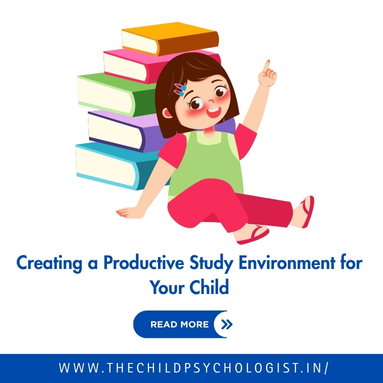By Dr. Vini Jhariya | Child & Clinical Psychologist | Founder, Urjasvini Child Development Center, Indore
A Strong Foundation for Learning Begins at Home
A child’s learning environment at home can play a major role in how effectively they study, retain information, and enjoy the process of learning. Whether your child is neurotypical or neurodiverse, creating a structured and distraction-free study space helps promote consistency, reduce stress, and foster a healthy academic routine.
At Urjasvini Child Development Center, our team — including qualified child behavioral therapists and childhood trauma specialists — emphasizes the importance of nurturing environments that support both emotional and academic development.
Why a Dedicated Study Space Matters
Children thrive in structured environments. When they have a well-organized and clutter-free study zone, they are more likely to develop:
- Focused study habits
- Increased motivation
- Stronger memory retention
- Confidence in their learning process
Scientific research also shows that a well-designed space enhances cognitive performance and supports long-term development, especially when paired with behaviour counselling or routine emotional support.
6 Practical Tips to Create the Perfect Study Environment
1. Choose the Right Spot
Expert Tip: Quiet, low-traffic areas work best.
Avoid noisy places like the kitchen or the living room. A corner of the bedroom with good lighting and minimal distractions can become the ideal study sanctuary.
2. Organize Supplies Neatly
Expert Tip: Disorganization increases stress and reduces attention.
Use bins, shelves, or desk drawers to neatly store stationery and books. Having a tidy space prevents procrastination and improves time management.
3. Ensure Proper Lighting
Expert Tip: Dim lighting causes fatigue and eye strain.
Natural light during the day is ideal. At night, use a warm desk lamp to prevent glare and help your child stay focused longer without tiring easily.
4. Add a Personal Touch
Expert Tip: Personalization builds ownership.
Let your child decorate their space with art, inspirational quotes, or fun stationery. When children feel emotionally connected to their environment, they’re more motivated to spend time there.
5. Minimize Distractions
Expert Tip: Distractions disrupt focus and learning flow.
Remove phones, toys, or unrelated gadgets from the study area. For sensitive or neurodiverse children, soft instrumental music or noise-canceling headphones can significantly improve concentration.
6. Prioritize Comfortable Seating
Expert Tip: Physical discomfort leads to restlessness.
Ensure the chair and table are ergonomically suitable. Use a cushion or footrest if needed. Comfortable posture supports longer and more productive study sessions.
Bonus Tip: Add a Visual Study Schedule
Children — especially those with ADHD or executive functioning challenges — benefit greatly from visual planning tools. Use a dry-erase calendar or a magnetic timetable to help them track tasks, breaks, and goals.
More Than Just a Desk
Setting up a productive study space goes beyond furniture — it’s about creating an emotionally supportive and structured environment that helps children feel calm, confident, and capable.
If your child struggles with concentration, shows signs of anxiety during study time, or has difficulty staying organized, it may indicate deeper emotional needs. In such cases, working with a child behavioral therapist or seeking behavior counselling can help unlock their full potential.
Let’s Build a Brighter Future Together
At Urjasvini Child Development Center, Indore, we specialize in:
- Study habit building
- Behavior management
- Emotional resilience
- Therapy for children recovering from childhood trauma
If you’ve been looking for a childhood trauma therapist near me or need expert help in setting up a productive home study routine, we’re here for you.
